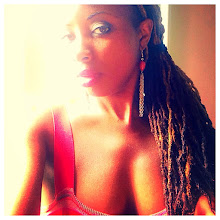What is a Diva Feminist? Simply stated, my diva feminism is being audacious, vibrant, passionate, and fierce in my dedication to eradicating racism, poverty, sexism, homophobia, religious intolerance, and other forms of socio-historical, political, and cultural oppression and exploitation. And oh yeah, with a requisite touch of flyness.
About Me

- Diva Feminist
- I am a feminist/aspiring public intellectual/ godmother/friend/diva/ free-spirit committed to eradicating racism, sexism, homophobia, transphobia, ableism, poverty, and other inequities and disparities. I am an Assistant Professor of Women and Gender Studies at University of Missouri-Columbia. I believe in the power of words, images and of informed action. My interests are broad and encompass the significant and the trite. Follow me and get the "diva feminist" perspective on what's going on in our communities!!!
Tuesday, September 21, 2010
For Colored Girls- Cautiously Optimistic...
In the Winter of 2003/2004, I had the distinct pleasure to co-direct, choreograph, and perform in a production of Ntozake Shange's ground-breaking work, For Colored Girls Who Have Considered Suicide When the Rainbow Is Enuf. To say that the experience was life-changing and wholly transformative would be a gross understatement. The journey we took as a cast as we delved into the rich historical and lived experiences of black and brown women compelled us to engage with our herstories and the infinite hues of a colored girl's existence. We embarked upon understanding the "metaphysical dilemma" of being colored girls. Although our creative process forced us to delve into the painful, the traumatic, and the repressed, we each walked a way with a joy, a fire, and memories of laughter that did not simply validate, but that heralded the telling of black girls' stories.
Over five years later, when rumors began to circulate about a film version of this amazing feminist work, I felt a barrage of emotions that ranged from impassioned excitement to enthralling anger. Why anger? I could not imagine a "Hollywood" treatment of this foundational work, which greatly inspired and influenced the emergence of my feminist voice. That anger soon subsided, as I became cautiously optimistic about the possibilities of exposing a new generation or perhaps a broader audience to black feminist cultural production. This measured optimism however, was short-lived; the announcement of Tyler Perry as director, writer, and producer of the film re-ignited my anger.
I shared my incensed response with colleagues and friends, as I could not comprehend why Perry thought he would succeed at capturing the contours, nuances, and feminist standpoints extant in Shange's choreopoem. I thought about Perry's arsenal of "controlling images" of black womanhood that circulated in his plays, films, and television shows. I contemplated a list of directors I felt were more qualified to bring For Colored Girls to life: Julie Dash, Kasi Lemmons, Cauleen Smith, Leslie Harris, Gina Prince-Bythewood, or Cheryl Dunye. (This list is in no way comprehensive, but just a sampling of a few dynamic women of color directors/producers) I took a brief pause from my anger and began pondering the possibility that Perry would serve more as the Producer/Presenter of the work (a la Precious) and select a writer and or director to bring Shange's words to life. Alas, this was not the case.
As casting decisions became public knowledge, I allowed myself re-entry into a space of cautious optimism. With dynamic performers such as Phyllicia Rashad, Whoopi Goldberg, Loretta Devine, and Kimberly Elise, I imagined the life these women would bring to these words and the sincerity with which each of these artists could approach performing/articulating black womanhood(s). Surely their ability coupled with the pure brilliance and evocative power of Shange's work would allow for a solid, if not moving film adaptation.
FINALLY... the release of the trailer. My response: CAUTIOUS OPTIMISM! Just hearing the words again, being entranced by a new, collaborative version of Nina Simone's "Four Women," and seeing so many black women being featured in a film led me to a new phase in my outlook about this film. I reaffirmed my belief in the power of black women's stories and the liberatory potential of performance as a vehicle for challenging and empowering marginalized individuals and communities. Although Perry may not have been my first or 30th choice to direct this film, I firmly believe that Shange's words and this collective body of black women performers will offer its audience a glimpse into the transformative space of black feminist cultural production through the lens of stories about and for colored girls who have considered suicide when the rainbow is enuf.
Subscribe to:
Post Comments (Atom)
your are A FOOL!!!
ReplyDelete